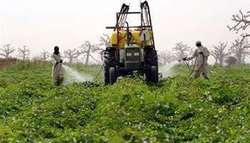Agencia de Informaçao de Moçambique | 18 April 2012
Mozambique: World Bank to discuss land policy in the country
London — A policy paper will next week be presented to the annual World Bank conference on land and poverty in Washington DC in the United States, which focuses on the confrontation between peasant producers and investors in the Mozambican province of Zambezia.
Written by Simon Norfolk and Joseph Hanlon, the paper looks at divisions in the Mozambican government over whether it should support foreign investment to promote a technological leap in agriculture, or if it should support small scale farming to increase productivity.
The paper shows that current agricultural productivity is very low in small farms, with only five per cent using irrigation, four per cent using chemical fertilizer, three per cent using pesticides and two per cent having access to credit. It states that the farms are small because the farmers mainly use hoes, with only eleven per cent using animal traction and two per cent using tractors.
However, the paper argues that this means that it is possible to greatly boost productivity, increasing the income of the peasant farmers.
In support of this, it gives the example of a project supported by the Cooperative League of the USA, CLUSA, at Hoyo Hoyo in Lioma, Zambezia province.
The project supported 5,000 farmers in 112 farming associations, which provided soybeans for local chicken farmers.
The authors used this example because it is the scene of serious conflict with the Portuguese company, Quifel, who have been given a concession to farm 10,000 hectares in the same area, which overlaps with land already used by 244 of the CLUSA supported farmers.
The paper draws out many of the shortcomings of the Quifel project: the lack of real investment compared with the amount promised; the belief that Quifel has focused on land already cleared by the previous farmers; problems in the consultation process; and disagreements between local and district authorities on one hand and the provincial government on the other.
Another example used in the paper highlights that even the most ethical and environmentally caring investor can find large scale projects difficult.
The Global Solidarity Forest Fund, GSFF, was founded by the Nordic churches and has been joined by the pension fund of Dutch teachers to invest in forestry in Mozambique. It began to develop several forests in Niassa and Zambezia growing teak, pine and eucalyptus.
However, this project has had severe difficulties, including the authorities finding that it had illegally occupied 32,000 hectares of land and that its community consultation process was "often intentionally falsified".
The Anglican Bishop of Niassa, who was chair of the GSFF in Mozambique, resigned in protest in 2010 and during 2011 the entire management in both Sweden and Mozambique were dismissed.
Norfolk and Hanlon note a shift away from government support for the plantation model for agricultural development. They see the appointment of Jose Pacheco as Minister of Agriculture in October 2010 as an important change, stating "he is a Frelimo heavyweight, a member of the Frelimo Political Commission and a former Minister of the Interior. But he is also a trained agricultural manager ... and has always wanted this post".
The authors consider that the Strategic Agriculture Plan 2011 - 2020 sets out a major shift in policy, with donors and foreign investors hardly receiving a mention.
In its place, the stress is on domestic investment and making small and medium scale farmers more productive and competitive through support from the state in the form of rural extensionists, agronomic research, domestic seed production, input supply and the local production of fertiliser.
The paper concludes that this policy shift "comes at a time when there is substantial rethinking caused by Mozambique's failure to reduce poverty and a realisation that production of agrofuels, food, and many export crops would create more livelihoods and do more to reduce poverty if they were done by smaller commercial farmers rather than large plantations".













